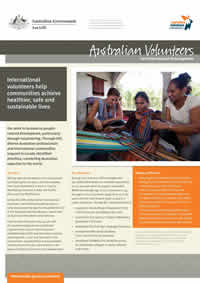Summary
This factsheet summarises the new Australian Volunteers for International Development program, and Australian Volunteers International.
Description
This factsheet summarises the new Australian Volunteers for International Development program, and Australian Volunteers International (AVI).
This publication is also available in PDF format:
Australian Volunteers for International Development–AVI [PDF 418kb]
International volunteers help communities achieve healthier, safe and sustainable lives
Our work is focused on peoplecentred development, particularly through volunteering. Through AVI, diverse Australian professionals and international communities respond to locally identified priorities, connecting Australian expertise to the world.
Our story
AVI has been at the forefront of international volunteering for 60 years, and has enabled over 7500 Australians to work in over 70 developing countries in Asia, the Pacific, Africa and the Middle East.
As the first official Australian international volunteer, Herb Feith's pioneering work in Indonesia paved the way for the establishment of the Overseas Services Bureau, now known as Australian Volunteers International.
Over the past five years over 34 per cent of volunteer assignments contributed to governance, 25 per cent focused on strengthening health and education systems and programs, 11 per cent focused on the environment, sustainability and sustainable livelihoods and five per cent worked in the areas of infrastructure and rural development.
Making a difference
- Trish Vogel received the South Australian Emergency Services Medal for her work as a volunteer paramedic in Vanuatu.
- Physical Therapist Alice Thomas was nominated for a humanitarian award by the Ryder Cheshire Foundation and Klibur Domin, East Timor for her work in Timor's disability sector.
- Volunteer Capacity Building Officer Jean Thomas received the prestigious Future for Nature Award for her work with the Tenkile Conservation Alliance in Papua New Guinea.
Our volunteers
During 2005 and 2010, AVI managed over 790 skilled Australians on volunteer placements in 24 countries with the support of AusAID. While the average age of our volunteers is 44, the ages of our volunteers range from 23 to 80 years old and most have at least 10 years of career expertise. Through AVI, these Australians:
- assisted in the drafting of Swaziland's first Child Protection and Welfare Bill 2008
- trained the first Hamlin College of Midwifery graduates in Ethiopia
- developed Fiji's first Sign Language Dictionary
- established Nino Konis Santana, Timor-Leste's first national park
- developed UNRWA's first disability policy for Palestinian refugees in Syria, Lebanon and Jordan.
By training more than 150 community animal health workers and government field officers in animal health care in his role as a Field Veterinary Officer, Pat Boland has strengthened the Small Scale Livestock Promotion Program's (SSLPP) efforts to improve the lives of Malawi's small scale livestock farmers.
It is estimated that eight million people live below the poverty line in Malawi and that 90 per cent of them live in rural areas and depend on small scale farming for their livelihoods. Community animal health workers and government field officers work directly with these farmers to provide them with a basic level of animal health care information. The number of these workers have dropped by more than 50 percent over the past 10 years, so with SSLPP staff, Pat looked at ways to work more efficiently with these thinly stretched government services through education, participation and access to information.
By improving farming practices and increasing the number of people trained in animal health care, Pat's work has also supported the objectives of SSLPP to assist communities in combating poverty through income generation, tackling HIV/AIDS and addressing issues of nutrition and food security. SSLPP also estimates 67 per cent of its beneficiaries are women and this has both directly and indirectly assisted in overcoming issues of gender equality.
Upon completion of his assignment Pat trained SSLPP staff to deliver the 10-day training workshop for community health workers he designed. The training has also been translated into the local language, Chichewa. He also developed an SSLPP website and participated in delivering refresher training to 40 government and field extension staff in animal health and production.

